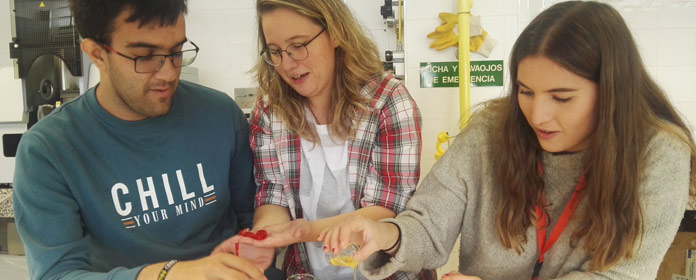Scientific experiments in the "Campus Inclusive".
16 young people with disabilities or at risk of social exclusion participate this week in the VII edition of Campus Inclusive, campus without limits organized by the University of Navarra and the Public University of Navarra.

The School of Sciences joins one more year the program 'Campus Inclusive, campus without limits' whose main goal is that young people "with different abilities" have the opportunity to continue with their programs of study.
The Science School has prepared a series of experiments on Chemistry and physics that the participants have carried out for an hour. In the first exercise, the students worked with a natural polymer (sodium alginate) - extracted from brown algae - which is used in molecular cuisine to make spherifications. This experiment was led by Professor Cristina Sola.
"We teach in a very didactic way so that they can learn new things. There are certain disabilities that do not limit you to learn Chemistry and can even get you excited," said Fidel Gonzalez, PhD student of Chemistry and monitor of these experiments.
In the second experiment, students studied the absorbency of diapers by experimenting with a synthetic polymer (sodium polyacrylate). "The idea is to give students a better understanding of the world we live in through experiments at Chemistry," said Max Petitjean, PhD student at Chemistry.
In addition, participants have been able to perform some physics experiments -directed by Dr. Carmen Palacios- among which those related to electrostatics, synchronization and mechanics with pendulums and metronomes, plasma lamp or chaotic movements stand out.
On the other hand, Maider Triviño, a former student of Biochemistry , has collaborated for the third consecutive year in this initiative in which she herself participated as a student. "Five years ago I participated in this campus. It was my first year at university and I was very lost," says the young woman, who has Asperger's syndrome. "It helped me. I met a lot of people and now it's my third year as a volunteer. There are people with Asperger's syndrome who can study at the university and don't do it because they don't want to leave their environment, but they can," she says.
Since last Saturday, the young people have been participating in different academic, sports, cultural and leisure activities and visiting the different Schools of the two campus. They come from Navarra, but also from Valladolid, Madrid, Guipúzcoa, Zaragoza, Granada and from Venezuela, Colombia, Morocco or Peru. Each one with their own particularities, with different Degrees of physical or intellectual disability, at risk of social exclusion, but with a dream that can come true: to study at a university.
